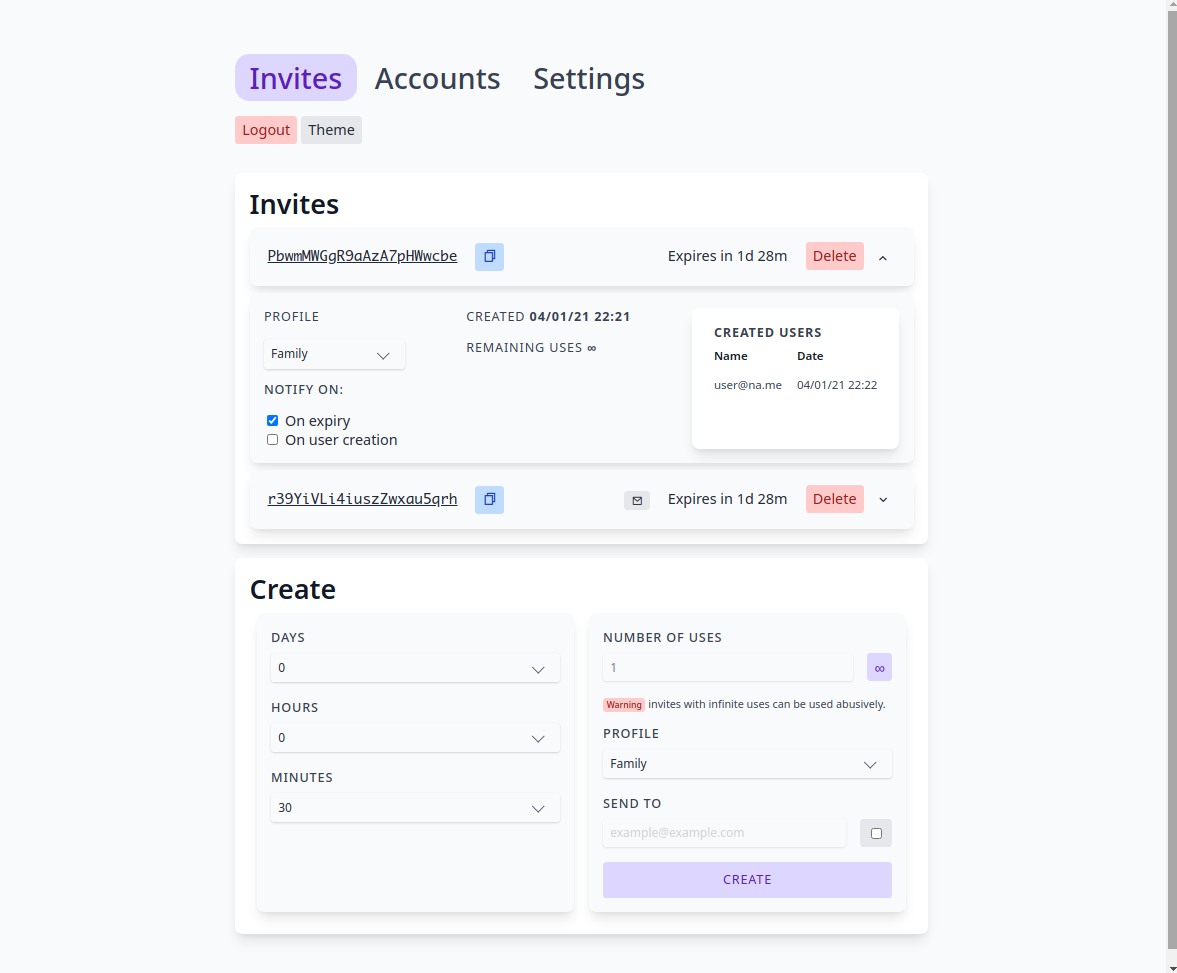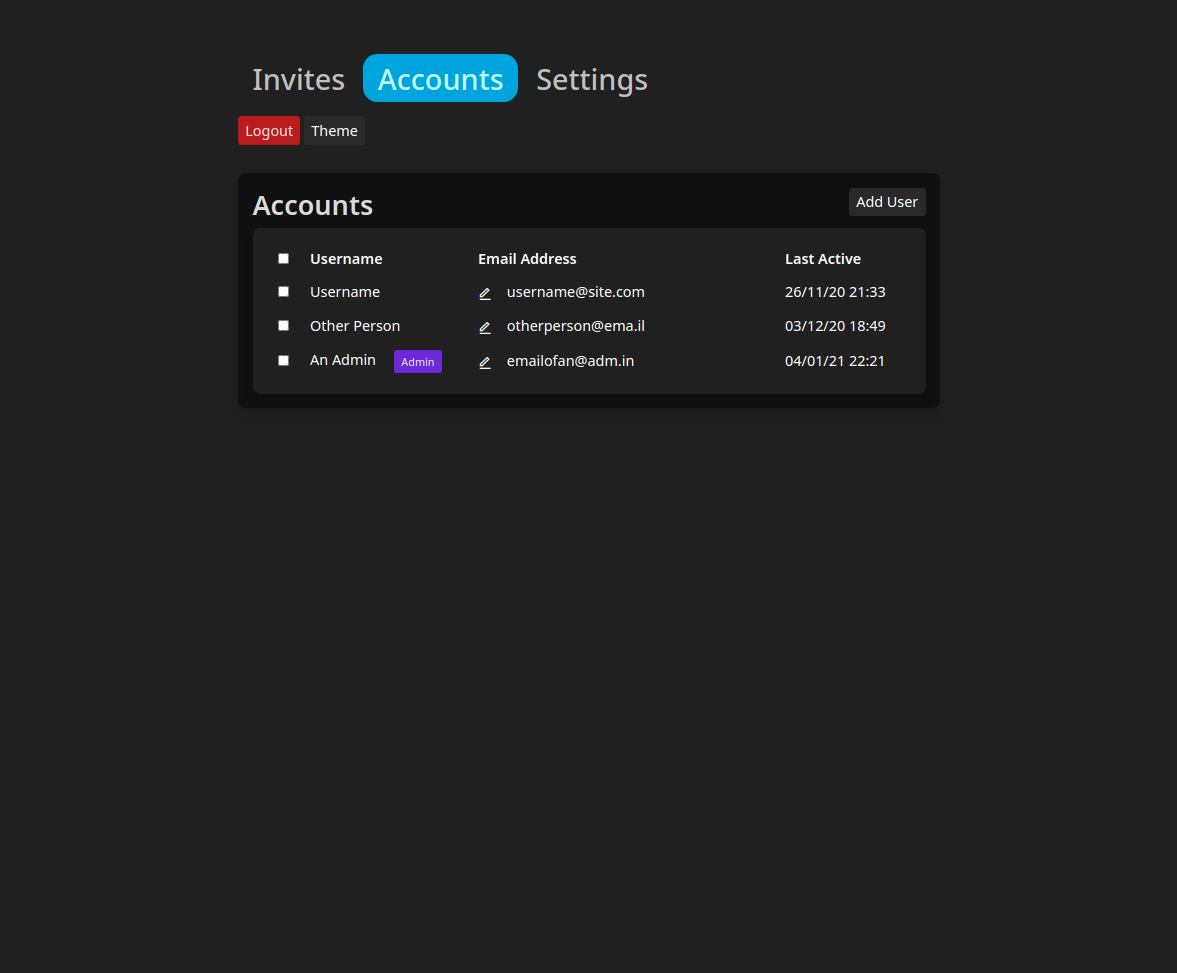Variables are surrounded by {}, and initial (default) templates are
generated on demand from the plaintext version of emails. The custom
emails are intended to only be used if the user actually changes them,
as they lose the features of the default ones, such as tables.
|
||
|---|---|---|
| .github | ||
| common | ||
| config | ||
| css | ||
| docs | ||
| embed | ||
| html | ||
| images | ||
| lang | ||
| mediabrowser | ||
| ombi | ||
| scripts | ||
| static | ||
| ts | ||
| .drone.yml | ||
| .gitignore | ||
| .goreleaser.yml | ||
| api.go | ||
| auth.go | ||
| config.go | ||
| CONTRIBUTING.md | ||
| daemon.go | ||
| Dockerfile | ||
| email.go | ||
| go.mod | ||
| go.sum | ||
| lang.go | ||
| LICENSE | ||
| logger.go | ||
| main.go | ||
| Makefile | ||
| models.go | ||
| package-lock.json | ||
| package.json | ||
| pwreset.go | ||
| pwval.go | ||
| README.md | ||
| router.go | ||
| setup.go | ||
| static.go | ||
| storage.go | ||
| views.go | ||
jfa-go is a user management app for Jellyfin (and now Emby) that provides invite-based account creation as well as other features that make one's instance much easier to manage.
I chose to rewrite the python jellyfin-accounts in Go mainly as a learning experience, but also to slightly improve speeds and efficiency.
Features
- 🧑 Invite based account creation: Sends invites to your friends or family, and let them choose their own username and password without relying on you.
- Send invites via a link and/or email
- Granular control over invites: Validity period as well as number of uses can be specified.
- Account profiles: Assign settings profiles to invites so new users have your predefined permissions, homescreen layout, etc. applied to their account on creation.
- Password validation: Ensure users choose a strong password.
- 🔗 Ombi Integration: Automatically creates Ombi accounts for new users using their email address and login details, and your own defined set of permissions.
- Account management: Apply settings to your users individually or en masse, and delete users, optionally sending them an email notification with a reason.
- 📨 Email storage: Add your existing users email addresses through the UI, and jfa-go will ask new users for them on account creation.
- Email addresses can optionally be used instead of usernames
- 🔑 Password resets: When user's forget their passwords and request a change in Jellyfin, jfa-go reads the PIN from the created file and sends it straight to the user via email.
- Notifications: Get notified when someone creates an account, or an invite expires.
- 📣 Announcements: Bulk email you users with announcements about your server.
- Authentication via Jellyfin: Instead of using separate credentials for jfa-go and Jellyfin, jfa-go can use it as the authentication provider.
- Enables the usage of jfa-go by multiple people
- 🌓 Customizable look
- Specify contact and help messages to appear in emails and pages
- Light and dark themes available
Interface
Install
The Docker image is your best bet.
docker create \
--name "jfa-go" \ # Whatever you want to name it
-p 8056:8056 \
# -p 8057:8057 if using tls
-v /path/to/.config/jfa-go:/data \ # Path to wherever you want to store the config file and other data
-v /path/to/jellyfin:/jf \ # Path to jellyfin config directory
-v /etc/localtime:/etc/localtime:ro \ # Makes sure time is correct
hrfee/jfa-go # hrfee/jfa-go:unstable for latest build from git
Available on the AUR as jfa-go or jfa-go-git.
For other platforms, grab an archive from the release section for your platform (or nightly builds here), and extract the jfa-go executable to somewhere useful.
- For *nix/macOS users,
chmod +x jfa-gothen place it somewhere in your PATH like/usr/bin.
Run the executable to start.
Build from source
If you're using docker, a Dockerfile is provided that builds from source.
Otherwise, full build instructions can be found here.
Usage
Simply run jfa-go to start the application. A setup wizard will start on localhost:8056 (or your own specified address). Upon completion, refresh the page.
Note: jfa-go does not run as a daemon by default. You'll need to figure this out yourself.
Usage of ./jfa-go:
-config string
alternate path to config file. (default "~/.config/jfa-go/config.ini")
-data string
alternate path to data directory. (default "~/.config/jfa-go")
-debug
Enables debug logging and exposes pprof.
-host string
alternate address to host web ui on.
-port int
alternate port to host web ui on.
-swagger
Enable swagger at /swagger/index.html
If you're switching from jellyfin-accounts, copy your existing ~/.jf-accounts to:
XDG_CONFIG_DIR/jfa-go(usually ~/.config/jfa-go) on *nix systems,%AppData%/jfa-goon Windows,~/Library/Application Support/jfa-goon macOS.
(or specify config/data path with -config/-data respectively.)
Contributing
See CONTRIBUTING.md.
Translation
For translations, use the weblate instance here. You can login with github.




